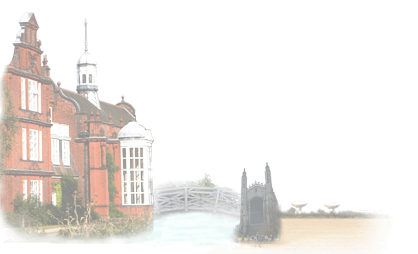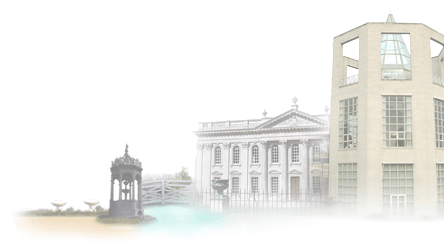A Cambridge perspective
on the digital world



May 2002
The BBC's Reith Lectures 2002 given by Baroness Onora O'Neill, the principal of Newnham College, University of Cambridge have focussed on trust. As a throwaway comment in the Question and Answer section of the first lecture Baroness O'Neill said:
...I think that there are ways in which we may over time realise that the great free-for-all of the Internet is actually very destructive to trust […] I think it's going to be very difficult to achieve a culture of accountability of a reasoned sort in different parts of society and I think the Internet[…] is going to be one of the hardest of all. At the moment yes, I think it's like buying snake oil.
Yet for many of us working in and with digital media, the exact opposite is our everyday experience. We have learned to work with and trust people at vast geographical and cultural distances. Many of us use as our first and most trusted source for information not print media, but our own skills at manipulating the search engines. These cover not just the Web but the business & academic databases where we swiftly filter out the irrelevant and arrow in on the information we require. Rather than have our opinions formed out of second or third hand accounts or predigested by the journalists of one newspaper as in the past, we may be comparing several accounts, emailing the original source, checking out the opinions in professional newsgroups, emailing colleagues nearer placed to the event... Or are we deluding ourselves?
Professor O'Neill's comment shows the level of suspicion that unfortunately still exists at even the highest levels of academia, where , in theory at least, Internet usage has been commonplace for the longest time. Of course, the old cartoon ,"On the Internet, no-one knows you're a dog..." still lingers on too close to the surface in some minds. Yet it is within the schools and universities that the skills for assessing what is or is not worthy of trust should be being taught.
In our own research into lifelong learning, we have discovered that in business as well as academia we are faced with a widening skills gap, and one which is unlikely under present policies to get any narrower. At the one end there are experienced senior managers still clinging to the idea that by refusing to learn to swiftly sift and filter email (in some cases, refusing to use email at all), they are preserving themselves and their time for some higher intellectual process. Early retirements or forced redundancies are not the answer, as inside those heads are the skills and expertise which need to be passed on to the next generation of managers. At the other end of the scale, we have school-leavers who may indeed enter the workplace with the skills to operate basic Microsoft packages, or who can surf the web for pleasure through a portal - but who do not know how to sift and filter the gold dust from the commercial dross, or the simply malicious.
Trust in a virtual world goes way beyond weighing the veracity of facts. There have grown up over the years many online communities, both professional and social, where people who are far apart geographically are in daily contact. This cuts through the usual hierarchies of business and academe. For many of us, the Internet has increased the number of people we can call on for technical expertise from the 25 or so 'local', to many hundreds and in some cases thousands. Such communities are self-selecting rather than created by professions or institutions. But their value - and trustworthiness - may be all the greater for that.
Participation in many of the technical lists and newsgroups for six or seven years has given us a knowledge base that allows us to confidently say, "We can't do this here in this office, but we know where there are 8 people who can..." Our trust has built up over the years: not only do we know who will give an accurate answer, but trusting them in a professional context, we are likely to trust them in other ways too, in the same way that we once might have trusted a 'local' figure in (supposed) authority.
Other than that this colleague may be geographically distant, this is no different to the mechanics by which trust has always been established in what sociologists call 'the public sphere'. In the early seventeenth century, when newspapers in a recognisably modern form first began to be sold and circulated in the coffee shops, the mainly foreign news would be read aloud, discussed, commented on, and public opinion formed by the leaders of the discussion.
Today, you will find people in the global 'virtual coffee shop', often in fact sitting in real coffee shops such as Starbucks in Houston, their laptop and wireless connection linking them and their frappacino to the rest of the newsgroup members in Rome, Tihuana, Bangalore, Cambridge, or New Zealand. They may be cooperatively solving a group member's coding problem, or working on a joint conference presentation, but they are just as likely to be discussing world events. Trust built in a professional context overflows into trust in opinions on global events.
The difference since the seventeenth century is that we have grown used to consuming our media privately, and public discussion has degenerated to football or soaps. The Internet is the medium that has moved discussion of meaningful events - from the intimate and personal to the globally political - out of the professional ghetto and into the wider community. We no longer consume trust, created for us by professionals and distributed by mass media; we participate in creating it. Naturally this causes problems - especially for those who have built a career on controlling trust and forming opinions for wider consumption.
In our view the Internet has made a dramatic net contribution to the quality of trust available, trust both in people and in information; but only for those who learn how to use it. Those who expect it to behave like conventional information sources, and conventional discussion fora, will be severely misled. What it provides does not come with an automatic quality label, social or professional. It contains things that are both much worse and much better - and certainly more numerous - than anything available through conventional channels. For those willing to learn how to make their own judgements, it allows assessments of trust that are both faster and more complete than anything previously possible.
©2002 Mediation Technology
